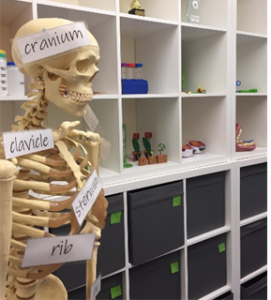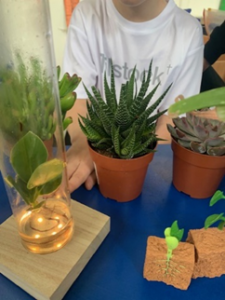Science
‘It is important to view knowledge as a sort of a semantic tree – make sure you understand the fundamental principles, i.e. the trunk and big branches, before you get into the leaves/details or there is nothing for them to hang on to.” Elon Musk
”My favourite Science lesson was when we made electrical circuits. It didn’t work at first but I kept trying different things. We had to design a carousel and make it light up and spin round. It was exciting” – Andre
Intent:
At Tilstock Primary School, through our teaching, attitudes and environment, we encourage children to be inquisitive throughout their time at school and beyond. Our Science curriculum encourages curiosity in our children about their universe and promotes respect for the living and non-living. Throughout our science units, the children will acquire and develop the key knowledge that has been identified within each unit and across each year group, as well as the application of scientific skills and positive attitudes.
We ensure that knowledge is built-on and the disciplines of Biology, Chemistry and Physics are developed throughout children’s time at the school so that they can apply their knowledge of science when using equipment, conducting experiments, building arguments and explaining concepts confidently. Inspired by a diverse range of great scientists across the world and throughout time, we hope that when our children leave our school they continue to ask questions and be curious about their surroundings.
Implementation
Our whole school approach to the teaching and learning of science involves the following:
- We create a positive attitude to science learning within their classrooms and reinforce an expectation that all children can achieve high standards in science.
- Science is taught in planned and carefully arranged topic blocks. Our 2 year rolling programme enables a spiral process that enables children to revisit key concepts in different concepts. This is a strategy to enable the achievement of a greater depth of knowledge.
- Through our planning, we involve problem solving opportunities that allow children to find out for themselves. Children are encouraged to ask their own questions and be given opportunities to use their working scientifically knowledge and research to discover the answers.
- Planning involves teachers creating engaging lessons, involving high-quality resources from ‘Developing Experts’ and STEM learning to aid children’s understanding of conceptual knowledge.
- Using Rosenshine’s principles, teachers use precise questioning in class to check conceptual knowledge and working scientifically and assess children regularly to identify those children with gaps in learning, so that all children keep up.
- Using our progression of knowledge planner teachers build upon the learning and knowledge of the previous years.
- Working Scientifically skills are embedded into lessons to ensure these skills are being developed throughout the children’s time in school. Teachers demonstrate how to use scientific equipment, and the various Working Scientifically disciplines in order to embed scientific understanding.
- New vocabulary and challenging concepts are introduced through direct teaching. This is developed through the years, in-keeping with the topics.
- Teachers find opportunities to develop children’s understanding of their surroundings by accessing outdoor learning, trips, workshops, and video links with experts.
- New vocabulary is taught directly, and is developed through the years, in-keeping with the topics.
- Children take part in regular events, such as Science Week or project days, provide broader provision where required and the acquisition and application of knowledge and skills. These events often involve families and the wider community.
Impact
This ‘Tilstock way’ is designed to allow children to consistently build upon their prior knowledge in small steps, embed procedural knowledge into long-term memory, whilst increasing their enthusiasm for the subject. This provides our children with the foundations and knowledge for understanding the world. Concepts taught are reinforced and children know how to develop as a scientist. With oracy a priority across the school, children are encouraged to explain their understanding of new concepts through dual -coding, stories, assemblies and videos- to teach others. Our engagement with the local environment ensures that children learn through varied and first hand experiences of the world around them, but also have the understanding that science has changed our lives and that it is vital to the world’s future.
Children learn as scientists, but also learn about real scientists and the possibilities for careers in science. From this, all children feel they are scientists and capable of achieving.
Science class curriculum planners 2 year rolling programme
Progression of knowledge
We ensure that all our children know, understand and remember the scientific enquiry required as part of their science curriculum. Children are actively encouraged to reflect and discuss on the key elements of enquiry they have shown either during a science lesson or in a STEM afternoon project. This is a really useful way not only for staff to assess the knowledge that is being developed overtime, but for children to self-assess as part of their ongoing development. We use our ‘Tilly Enquiry Wheel’ to capture this and the ‘working scientifically’ sheet for children to record how they have done this.
Scientists across our curriculum
Progression of knowledge by unit
Progression of skills
We ensure that all our children know, understand and remember the scientific enquiry required as part of their science curriculum. Children are actively encouraged to reflect and discuss on the key elements of enquiry they have shown either during a science lesson or in a STEM afternoon project. This is a really useful way not only for staff to assess the knowledge and skills that are developed overtime, but for children to self-assess as part of their ongoing development. We use our ‘Tilly Skills Wheel’ to capture this and the ‘Working like a Scientist’ sheet for children to record how they have done this.
Stories I can read at home that will help me
Also, look on our science pathway for specific termly stories that will help grow your vocabulary!
How can I help my child at home?
Science


